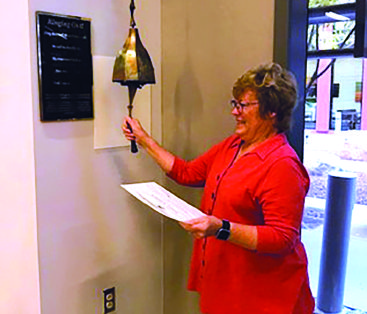
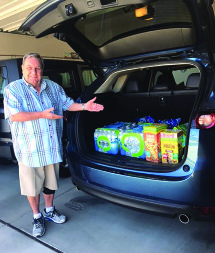
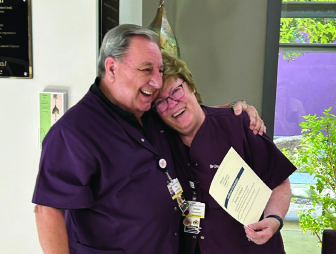
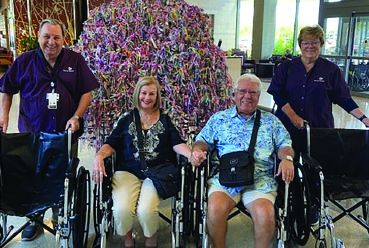
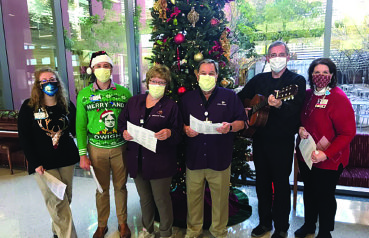
Wednesday is not just an ordinary weekday for Donna and Bill Schenck. For these Queen Creek residents, it’s a time to give back to the community that’s given so much to them.
For the last five years, the Schencks have volunteered at Banner MD Anderson Cancer Center in Gilbert. While greeting patients at the door or pushing those in wheelchairs to their appointments may seem like ordinary tasks, they know from personal experience just how much that can mean to those fighting for their lives.
Bill and Donna first met 52 years ago, and have been married almost as long. The pair enjoyed long careers in the technology industry and led active lifestyles in their spare time. All was well until the couple received a devastating wakeup call nearly nine years ago.
“I retired in 2015 in May, and right after I retired, Bill was diagnosed with stage IV lung cancer,” Donna said. “(The doctors) said, ‘You’re not going to live,’ and gave me 1%,” said Bill, especially after cancer was also found in his bones. Yet, against all odds, he went into remission in 2016.
The couple relocated to Arizona, only for Donna to be diagnosed with breast cancer in 2018. It was then that the Schencks were introduced to MD Anderson. Impressed by the treatment she received, the pair began their volunteering journey in 2019. “The services I had from the surgical team, from your chemotherapy, from your radiation, they take the time to really communicate with you, because you’re scared,” Donna said. “You don’t know what the next step is, but they take the time to really walk you through the process.”
That sense of comfort and peace of mind was something the Schencks wanted to share with others. “I’m not a medical person, but I’m at least able to help them through the processes here,” Donna said. “The only advantage we have is that we’ve been where they’re going,” Bill added.
The couple volunteers every Wednesday morning from 7 to 11 a.m. Their practical duties include greeting patients at the door, transporting them to various parts of the hospital via wheelchair, aiding in administrative tasks, delivering donated snacks, and sprucing up the hospital with holiday decorations.
“We’ve also been involved in a lot of the donation programs here and raising money,” Donna said. A special focus of theirs is sourcing money for wheelchairs via their very supportive neighbors and faith community.
“A lot of times, people want to make donations, but they don’t really know where,” Donna said. “When they come out here, they can see the dollars they donated and how they’re being used.”
However, the Schencks agreed that the most important aspect of their role was creating a supportive community for those going through treatment — something Donna was able to find strength in last year when her breast cancer returned. She eventually recovered, but it was a reminder that continued support means everything. “The cancer journey is not just a one-day appointment; it can be years,” Donna said.
“When I was going through treatment, I still volunteered downstairs because it was an opportunity to help somebody else.” Donna added. “To me, that’s probably the best service we can provide to the patients here.” Her husband agreed.
That service can take many forms — whether it’s advocating for a patient whose insurance stopped covering his medication or encouraging a defeatedsingle mother with colon cancer to give treatment one more shot. They will tell patients it’s their job to keep trying — for themselves and for their families — even if it means poking a little bit of fun. “If I can’t make them laugh in the first five minutes, I ain’t doing my job,” Bill said.
The Schencks also hope others join them in their volunteer work. They said that while the long hours on their feet leave them tired, it’s all worth it to offer a patient a helping hand and being known as the resident grandma and grandpa by younger staff — even if they have no children of their own. “You will be rewarded so much as a result of being here as a volunteer,” Donna said. “You’ll get more out of it than anything in your entire life,” Bill added.
Their work can probably best be summed up in little gift of faith and encouragement they pass on to patients who need it most — a coin bearing the likeness of St. Peregrine. Born in Forlì, Italy, in the 13th century, he is known as the patron saint of people suffering from cancer and other life-threatening diseases. On the back, the coin reads, “Cancer cannot cripple love.” Even in the face of uncertainty and fear, it lives on even in the smallest of ways — like a greeting at the door.

